
The large blue is a species of butterfly in the family Lycaenidae. The species was first defined in 1758 and first recorded in Britain in 1795. In 1979 the species became mostly extinct in Britain but has been successfully reintroduced with new conservation methods. The species is classified as "near threatened" on the IUCN Red List of Threatened Species. Today P. arion can be found in Europe, the Caucasus, Armenia, western Siberia, Altai, north-western Kazakhstan and Sichuan.

Myrmica rubra, also known as the common red ant or erroneously the European fire ant, is a species of ant of the genus Myrmica, found all over Europe and is now invasive in some parts of North America and Asia. It is mainly red in colour, with slightly darker pigmentation on the head. These ants live under stones and fallen trees, and in soil. They are aggressive, often attacking rather than running away, and are equipped with a stinger, though they lack the ability to spray formic acid like the genus Formica.

Phengaris alcon, the Alcon blue or Alcon large blue, is a butterfly of the family Lycaenidae and is found in Europe and across the Palearctic to Siberia and Mongolia.

Myrmica is a genus of ants within the subfamily Myrmicinae. It is widespread throughout the temperate regions of the Holarctic and high mountains in Southeast Asia.

Phengaris rebeli, common name mountain Alcon blue, is a species of butterfly in the family Lycaenidae. It was first found and described in Styria, Austria, on Mount Hochschwab around 1700. Although it was initially classified as a subspecies of P. alcon, a European researcher, Lucien A. Berger, designated it as a separate species in 1946. Genetic similarities between P. rebeli and P. alcon have led many researchers to argue that the two are the same species and differences are due to intraspecific variation.
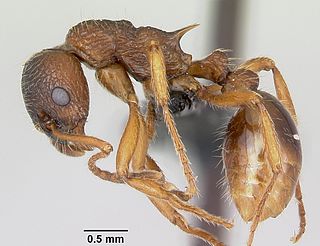
Myrmica ruginodis is a species of ant that lives in northern parts of Europe and Asia. It is very similar to M. rubra, but has a more northerly and higher-altitude distribution. Overwintering larvae may become either workers or queen ants, with up to 20 queens living in a colony of up to 2,500 individuals. Two subspecies are recognised, differing in the relative size of the queen.

Rickia wasmannii is a species of the widely distributed entomoparasitic order of fungi Laboulbeniales. It is an obligatory ectoparasite of ants of the genus Myrmica. The thalli penetrate outer layer of the cuticle, and appear on the host body surface. Little is known about its effect on the host ant, but it is usually regarded as a rather neutral symbiont. Contrarily, however, a recent study has documented an increased need of drinking water and a shortened life-span of infected ants.
Myrmica obscurata is a species of ant of the genus Myrmica. It is found in Sri Lanka.
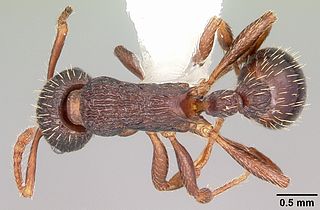
Myrmica spatulata is a species of ant in the family Formicidae. It is found in the forests of the middle and eastern part of the United States.

Myrmica americana is a species of ant in the family Myrmicinae. It can be found in all states in the U.S.A. besides Alaska, Hawaii, Oklahoma, Oregon, and Washington. It can also be found in all Canadian provinces besides New Brunswick, Yukon Territory, Northwest Territories, and Nunavut.
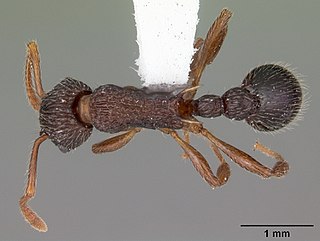
Myrmica punctiventris is a species of ant in the family Formicidae.
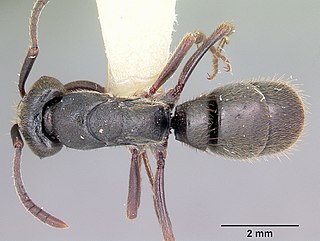
Pachycondyla harpax, the rapacious panther ant, is a species of ant in the family Formicidae.

Myrmica rugiventris is a species of ant in the family Formicidae.
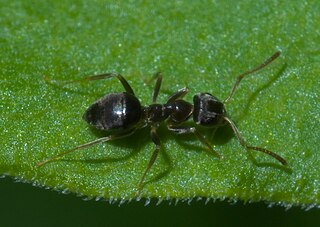
Lasiini is a tribe of ants in the family Formicidae. There are about 10 genera and more than 450 described species in Lasiini.

Formica integra is a species of ant in the family Formicidae.
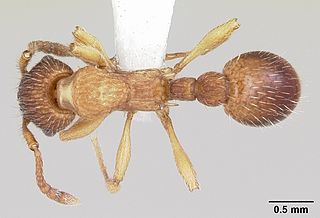
Myrmica pinetorum is a species of ant in the family Formicidae.

Camponotus tortuganus is a species of ant in the family Formicidae.

Myrmica incompleta is a species of ant in the family Formicidae.
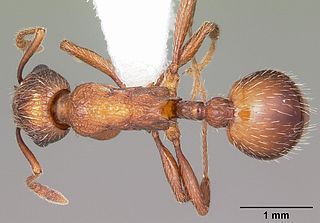
Myrmica brevispinosa is a species of ant in the family Formicidae. They can be found in the U.S.A. and Canada.




















